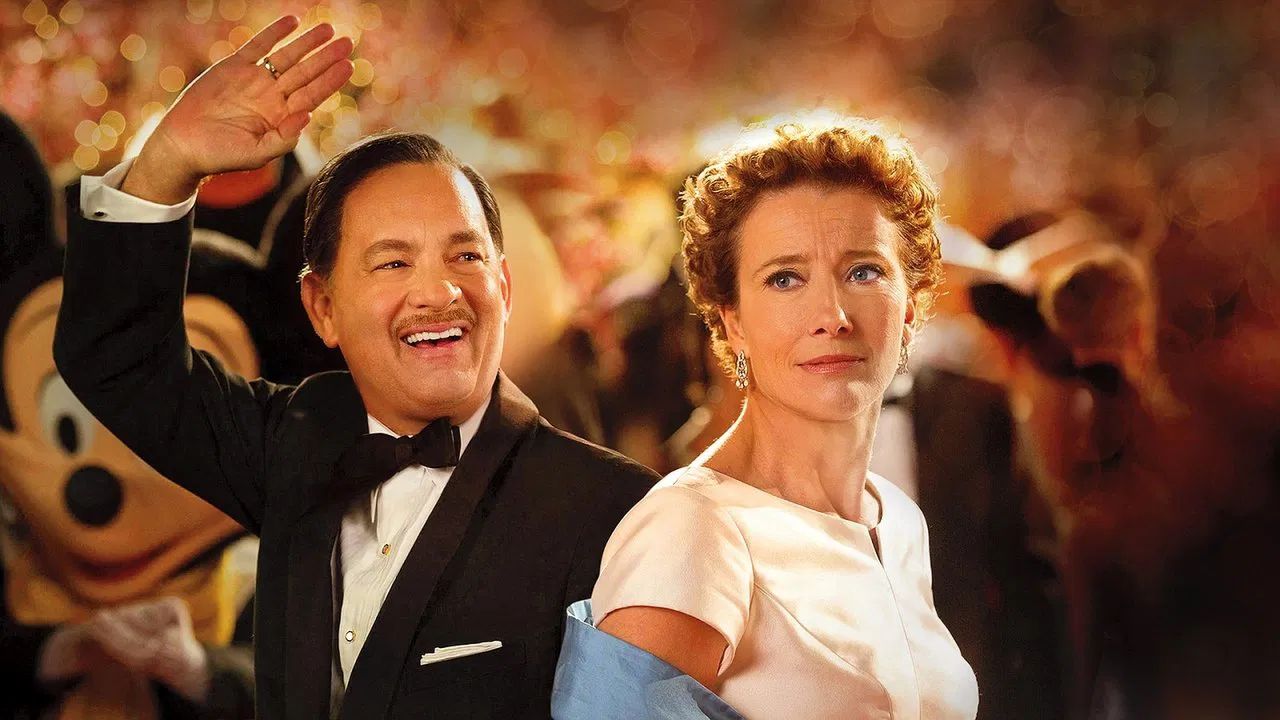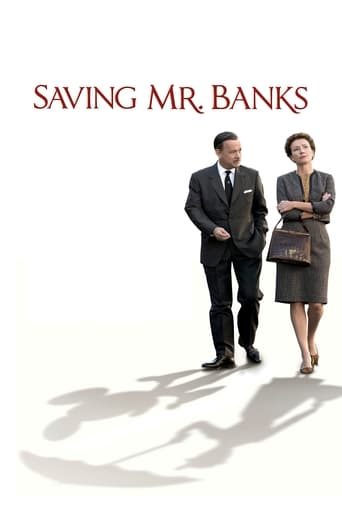

I was very surprised when my wife told me we were going to watch a movie about Mary Poppins. I rarely watch movies, I love reading books. Of course I had seen Mary Poppins probably 20 or more times over my life. Definitely a classic of Walt Disney's. So if you find out we were going to watch a movie about the movie, I settled in and hoped to enjoy it. I was not disappointed at all. I cried, I left, I was frustrated, I smile. This was needed in my life. I hope you enjoy the movie as much as I did with my family. You won't be disappointed
... View MoreWalt Disney has become a brand-name invoking a world of perpetual enchantment and demonstrations of friendliness so over the top they can confine to a tyranny of smiles. That's a very cynical way to look at it but not too far-fetched. Still, as a father of a little girl and given how enamored she was with "Frozen" and how she seems to enjoy the old cartoons I show her on Youtube, I can't deny that Disney (the man or the company) always had a way with children and pardon the cliché, the inner child in all of us.So it's quite fun to see the Walt Disney company producing a movie where all the archetypes of Disney would be disdained by a stuck-up British lady who's no one else but the writer of "Mary Poppins", P.L. Travers played by a delightful Emma Thompson. It's also fun to see the one receiving these critics being good old Disney himself, played by Tom Hanks. He doesn't try to imitate Disney but "Saving Mr. Banks" isn't intended to be a formal biopic about how the tycoon got the rights for what would become one of his most successful and iconic works.The film plays on a more emotional level, it is about two visions, two convictions that should have made Mickey Mouse and Mary Poppins walk hand-in-hand to contribute to a masterpiece (the poster is a perfect summary of the film on that level)... only it took twenty years. It was a promise made to his daughters that Walt Disney couldn't allow himself to break, make a film out Travers' classic "Mary Poppins", but the woman, a stubborn Aussie, wouldn't have the glitter and the schmaltzy bliss of Disney tarnish the legacy of her book. She had a misconception, taking Disney for some modern-day Santa Claus but so did Disney by misunderstanding the woman and ignoring the sources of her inspiration, some tragic ones.The film offers many flashbacks of Travers' childhood during which we witness the fallout of her family, from the descent into sickness and alcoholism of her father, to the attempted suicide of her mother and a nurse that took care of her family when she was seven. Just like John Lee Hancock's previous film "The Blind Side", the film seems very simple and straightforward until, you start to grasp a specific subtext. In "The Blind Side", there's a moment where we clearly question the motivations of the Tuohy Family, if it wasn't just about football, and then this question is answered. In "Mr Banks", we know Travers doesn't want any animation, any red color, but we quickly realize there's something else eating her.She wants Mr. Banks shaven, to be a good man, she has an obsession with Mr. Banks even more than the children or maybe Mary Poppins, the flashbacks centering on her well-meaning but unlucky father played by Colin Farrell allows us to reassemble the pieces of the puzzle and understand what the purpose of Mary Poppins was. There's a pattern in the film consisting on all the friendliest moments (and Travers is quite devoid of immediate warmth) involves a father or one invoking father's memories. Nothing Oedipal about it, it's just speaks about people who accomplished major works by translating the burden of their childhood into something positive.Of course, Disney's body of work is superior but there's no denial that Travers contributed to his most iconic creation, his first Best Picture nomination and a classic for all ages. We know "Mary Poppins" will be made anyway, and the efforts of the Sherman brothers or Disney executive will pay off, but the film is enjoyable on the simple level of these interactions and the so conflicting mentalities of Disney, a cheerful man but astute businessman and a woman who's taking her book very personally. It's only after she realizes how personal it is to Disney that she finally trusts him... and the rest is history.
... View MoreAs a child, one of my favorite movies was always "Mary Poppins". Being young, I obviously couldn't articulate exactly WHY I liked it so much (I'm sure the catchy music had a lot to do with it), but I wore a tract in the VCR with it, that is for sure. After seeing "Saving Mr. Banks", however, I was astounding to realize perhaps part of the reason why "Mary Poppins" stands the test of time: because the message behind it is one born out of real-life issues.For a basic plot summary, "Saving Mr. Banks" focuses on P.L. Travers (Emma Thompson), writer of the "Mary Poppins" children's novel. For 20 years, Walt Disney (Tom Hanks) has been pursuing the rights to make the book into a movie, finally culminating in him flying Travers to Los Angeles to begin work on the project. When Travers wants full creative control and clashes monumentally with Disney's version of the film, it is revealed (via flashbacks) how personal the Poppins story truly is to Travers.The reason why this movie is so touching and genuine is because it works on two different levels:On one hand, it brings back incredible nostalgia for fans of Disney's "Mary Poppins". Just hearing the iconic music again and seeing how key plot/character points came together is exciting.On the other hand, those (though probably few and far between) who haven't seen the movie will still be intrigued by the fascinating backstory of P.L. Travers. More specifically, the role her father (played by Colin Farrell) played in her life and how that relationship shaped her persona even into adulthood. Some fascinating human dynamics that prove out the old "truth is stranger than fiction" maxim.The hallmark of "Saving Mr. Banks", though, is its ability to have audiences laughing, crying, singing, and feeling all in the span of two hours. The complex characters, catchy tunes, and use of flashbacks prove a potent mixture of drama and fun. This is truly a film for the entire family.Until recently, "Prisoners" had been cemented atop my "Best Movie of 2013" list. "Saving Mr. Banks", however, is just as good, if only in a completely different way. I'm sure I'll enjoy some more genre Hollywood fare this holiday season ("Hobbit 2", "Anchorman 2", "Grudge Match", etc.), but I have a feeling that when all is said and done, this one will still be at the top of the heap.
... View MoreAn unhappy woman becomes a smashing success thanks to the publication of what is now a children's classic. Like many artists, she seemed to abhor fame and when Hollywood beckoned, she declined. Well, at least with the creator of the allegedly happiest place on earth. The woman was the Austrian born P.L. Travers, her boss to be Walt Disney, and her leading character a nanny almost as prickly as her who was known as Mary Poppins.It should be noted that the first production of Mary Poppins anywhere was a television version starring character actress Mary Wickes back in 1949. Ironically, right before the movie first went into production, Wickes posed for artist drawings for Cruella Deville in "101 Dalmatians". That was an the animated film, and P.L. Travers wanted no part of animation for her story. She showed up in Los Angeles in 1961 already copping an attitude, and her first meeting with Disney, songwriters the Sherman Brothers and the screenwriters and director did not go off well in the least. But as the Disney magic begin to roll in, this Travers focus on her life as a little girl, her family problems and incidents which she would later utilized in creating her classic stories. Some of the flashbacks slow the film down completely, but her character would not really be understandable had they been omitted.Honestly, I liked the character of P.L. Travers, here played by the glorious Emma Thompson portrayed with a prickly look like "Wicked Witch of the West" Margaret Hamilton. She is certainly not fond of little children, being rather aggravated by the presence of tons of teddy bears and other stuffed animals in her hotel room. She's rather curt with children when she meets them and even at Disneyland won't sign autographs. But in spite of all of that, there is something underneath the surface that shows the sad little girl, and because of that I was able to like her in spite of her being a tremendous grouch. When she during her first hearing of "Let's Go Fly a Kite", it is a magical moment just like the many that Disney provided over its glory years. I must admit, however, that Tom Hanks simply seems to be playing Tom Hanks, vaguely made up to resemble Walt Disney but really not coming like him from my memory of original building of the wonderful world of Disney back during the Glory Days of my own childhood. That is a minor complaint, because I have seen many other portrayals of real-life figures that were even further away than from what Hanks does with Walt. When Emma Thompson is on screen, the film truly shines and its success is due in the most part to her very detailed performance which is like nothing she had played every before. The conclusion of her story is sad, and her involvement with the much later stage version rather prickly as well, but what results is a fascinating story of great Hollywood history that minus the flaws was quite an achievement. In a sense, I liked it more than then the film which I think today is highly overrated, and certainly much more than the overblown version that came to Broadway in the middle of the first decade of the millennium.
... View More